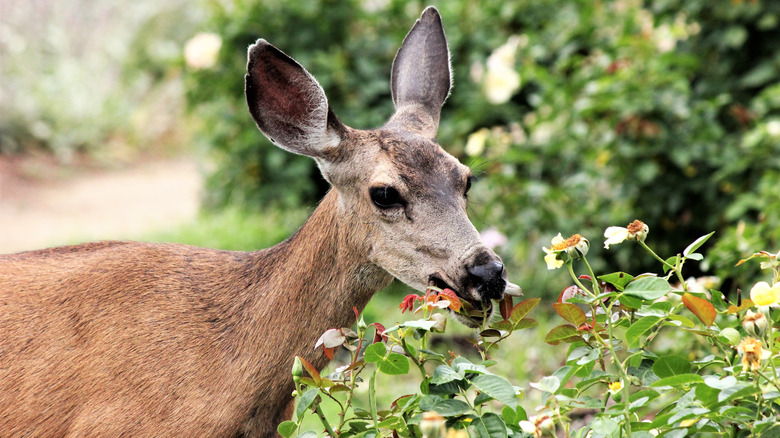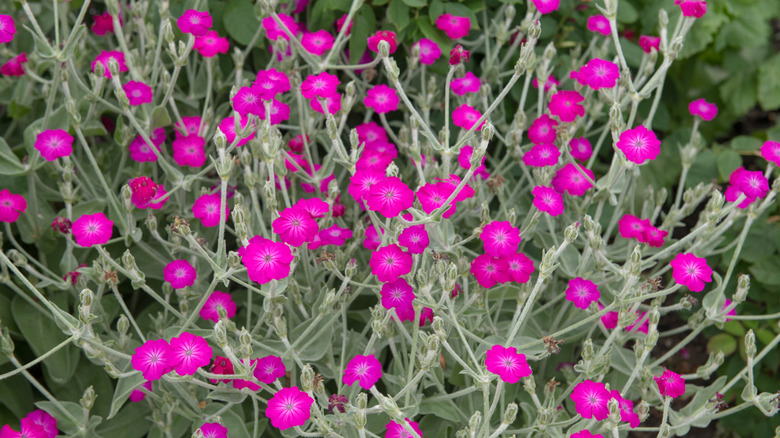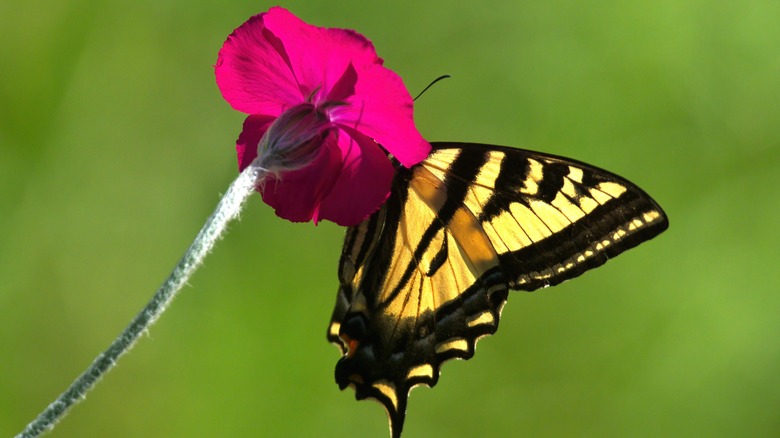The Beautiful Ornamental Plant That Deer And Other Pests Will Leave Alone
April showers bring May flowers, except when the deer get to them first. Wild deer often treat gardens like backyard buffets, causing devastating damage as they pig out on pansies and tear through tulips. Many gardening professionals suggest growing ornamental plants that deer find unpalatable to deter these destructive diners. Unfortunately, discerning which plants deer dislike can be challenging. Although many nurseries, gardening websites, and state agriculture departments publish lists of deer-resistant plants that might save your garden, deer apparently haven't bothered to read these lists. For every species touted as deer-resistant, there are multiple other firsthand accounts (often accompanied by photographic evidence) describing how deer devoured these plants.
The truth is, there are no deer-proof plants. However, there are plant species, like rose campion (Silene coronaria), that deer consistently snub. Native to southeastern Europe, this short-lived perennial and cousin to carnations grows well in many parts of the country. Rose campions form attractive, spreading mounds, making them a good choice for rock gardens, beds, and borders. Their silver-green, lace-like leaves and bold magenta flowers contrast nicely with other yellow- or blue-blooming garden plants. Although the flowers have no scent, they attract both butterflies and bees. Best of all, rose campion is low on a deer's preferred snacks list. If pansies and tulips are the potato chips of deer snacks, rose campion is more akin to celery sticks.
Why plants like rose campion deter deer and other pests
Deer reject rose campion for the same reason many people won't eat slimy, fibrous, or mushy foods — they hate the texture. Like all other plants in the Silene genus, the leaves and stems of rose campion are covered in dense and sometimes sticky hairs that deer don't seem to like. In fact, deer avoid most plants with fuzzy, prickly, spiny, or bristly leaves and stems. So, growing plants with these traits is one way to keep deer out of your yard. Of course, just because deer usually avoid rose campion doesn't mean they won't nibble on it now and then. When other food sources are low, and deer are hungry enough, they will eat whatever is available. (Even celery sticks look appetizing when you're starving.)
For example, a 2018 study from the Wildlife Society Bulletin found that deer often browsed on crocuses early in the spring when there were fewer other plants available, but they rarely touched these flowers once more palatable plants, like tulips and grape hyacinths, became more common. Additionally, deer prefer young, tender leaves to tougher, mature ones, so they often browse young plants regardless of the species. Young leaves also contain high levels of nitrogen and water, making them a nutrition-packed snack. Like deer, rabbits aren't fond of fuzzy textures, and they usually leave rose campion alone. Rose campion's sticky hairs also deter most insects and other invertebrates.
How to care for rose campion and other similar plants
If you're looking for a deer-resistant plant that will bring color to your yard, rose campion might be a solid, low-maintenance pick. This hardy, sun-loving flower grows best in USDA zones 4 through 10 and often remains evergreen in warmer climates. In addition to being drought-tolerant, rose campion isn't picky about soil types as long as they are well-drained. Although not officially listed as invasive, rose campion self-seeds and can spread aggressively.
Many other Silene species are native to the United States, and they all have fuzzy leaves and sticky, hairy stems that can deter deer. Several species also have stunning flowers, making them a great native alternative to rose campion. For instance, the royal catchfly (Silene regia) is a native perennial in several southeastern and central states. This plant has long, blade-like leaves, and in late spring and summer, it boasts striking star-shaped, scarlet flowers. Whether you opt for rose campion or another deer-resistant plant, be sure to test it in your garden before planting it widely. Like people, deer have personal preferences for certain foods. You don't want to invest time and money filling flower beds with campions only to discover that your local deer are among the few that prefer celery sticks to potato chips.


